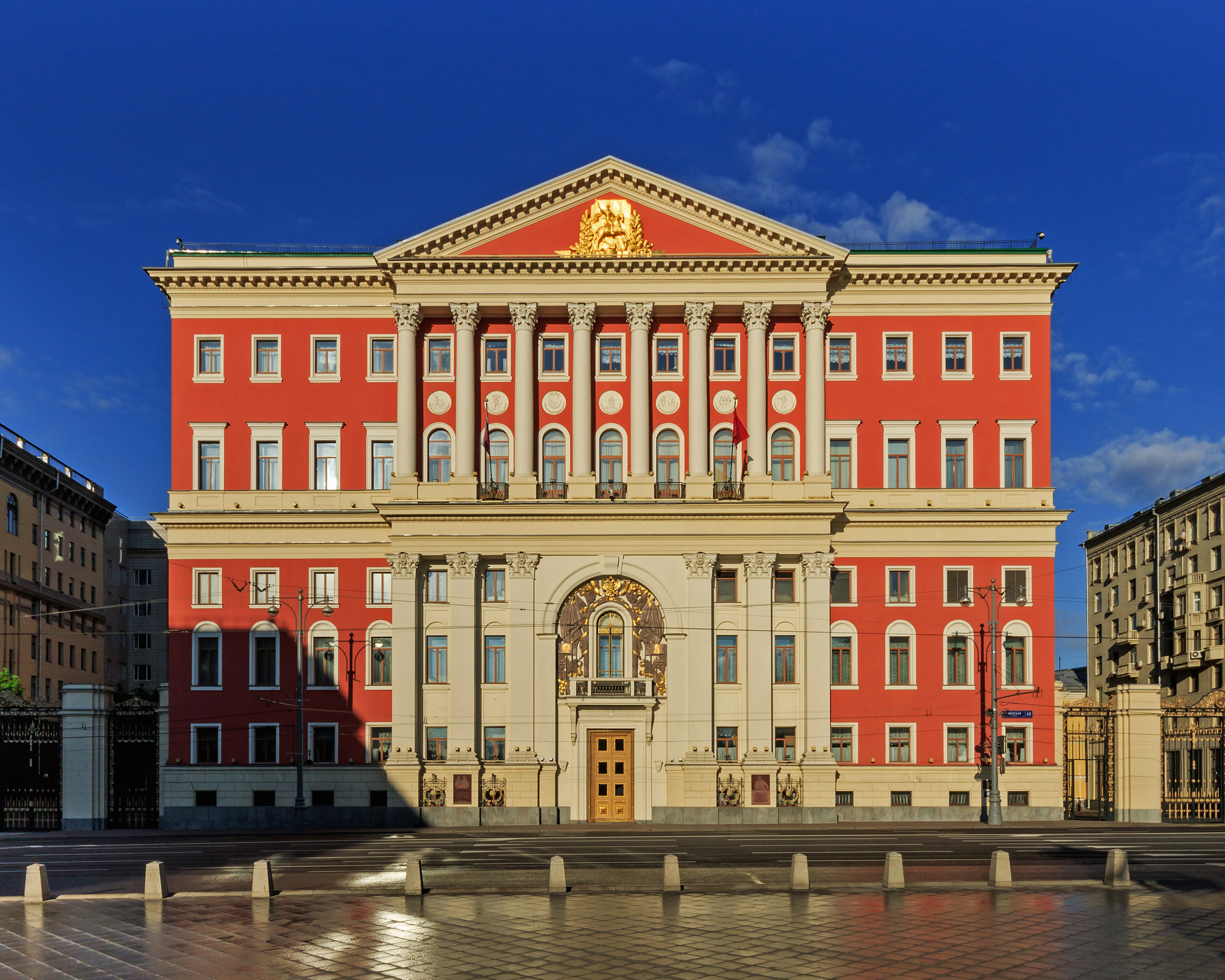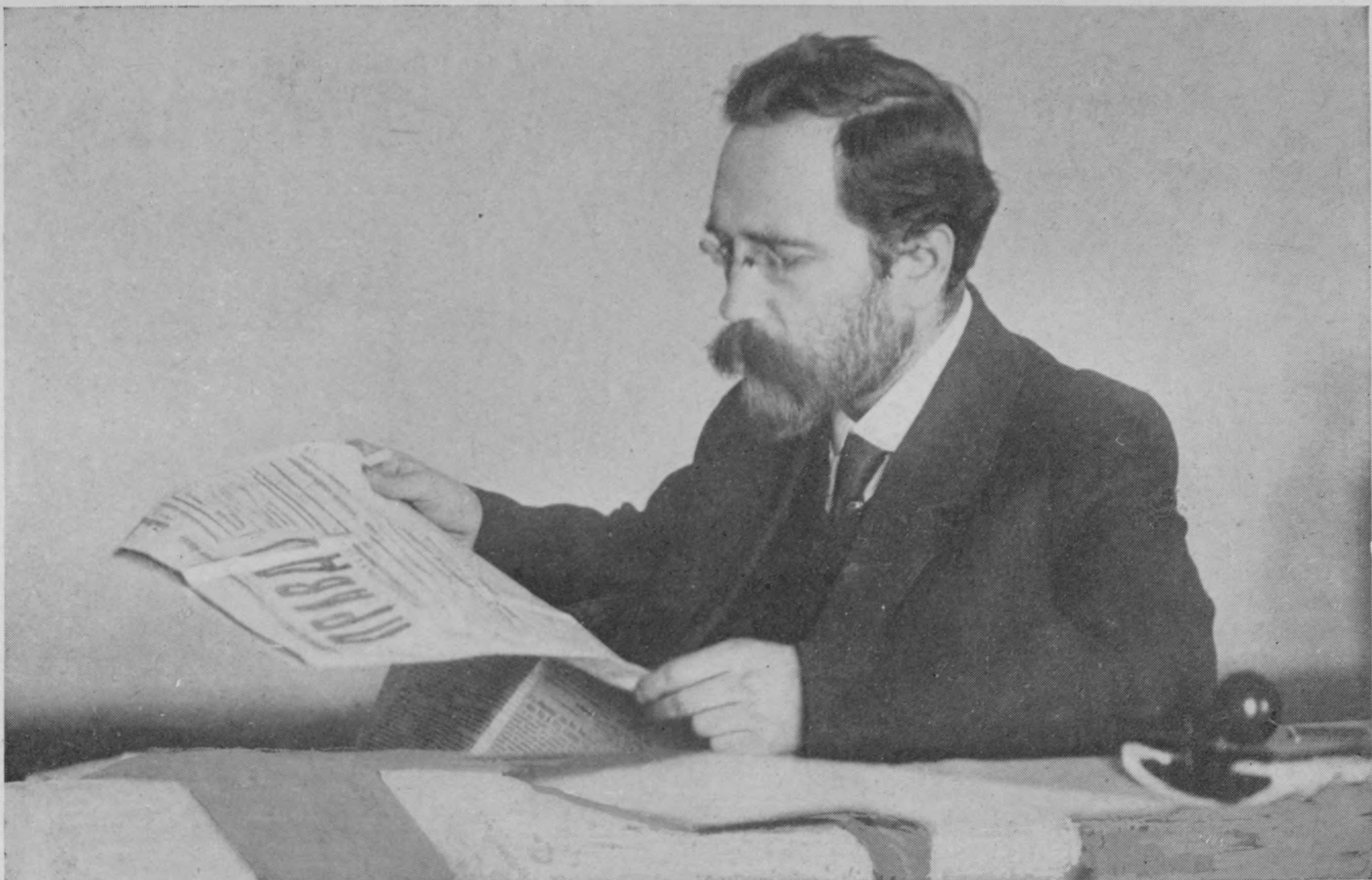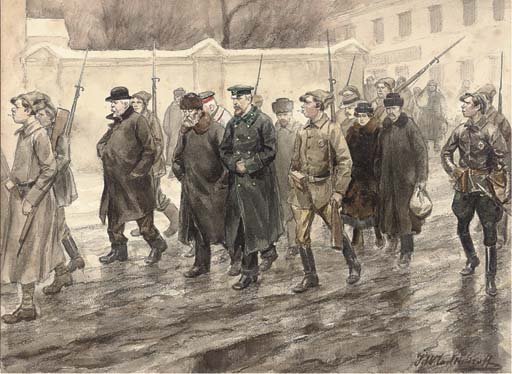|
Explosion In Leontievsky Lane
The Explosion in Leontievsky Lane on September 25, 1919 was a terrorist act committed by a group of anarchists with the aim of destroying the leadership of the Moscow Committee of the Russian Communist Party (Bolsheviks). As a result of the explosion of a bomb thrown by the terrorist Sobolev, 12 people were killed, another 55 were injured. Terrorist act On September 25, 1919, in the premises of the Moscow Committee of the Russian Communist Party (Bolsheviks), located in Leontievsky Lane, a meeting was held on the organization of agitation and the development of a work plan in party schools. Among those present were responsible party workers in Moscow, district delegates, agitators and lecturers, about 100–120 people in total. They were all cramped in a small room. The first to read their reports were a member of the Central Committee of the party Nikolai Bukharin, as well as the famous Bolsheviks Mikhail Pokrovsky and Yevgeny Preobrazhensky, the meeting began to analyze the plan f ... [...More Info...] [...Related Items...] OR: [Wikipedia] [Google] [Baidu] |
Communist Party Of The Soviet Union
" Hymn of the Bolshevik Party" , headquarters = 4 Staraya Square, Moscow , general_secretary = Vladimir Lenin (first)Mikhail Gorbachev (last) , founded = , banned = , founder = Vladimir Lenin , newspaper = '' Pravda'' , position = Far-left , international = , religion = State Atheism , predecessor = Bolshevik faction of the RSDLP , successor = UCP–CPSU , youth_wing = Little OctobristsKomsomol , wing1 = Young Pioneers , wing1_title = Pioneer wing , affiliation1_title = , affiliation1 = Bloc of Communists and Non-Partisans (1936–1991) , membership = 19,487,822 (early 1989 ) , ideology = , colours = Red , country = the Soviet Union The Communist Party of the Soviet Union (CPSU),; abbreviated in Russian as or also known by various other names during its history, was the founding and ruling party of the Sovi ... [...More Info...] [...Related Items...] OR: [Wikipedia] [Google] [Baidu] |
Mossoviet
The Mossoviet (Russian: Моссовет), an abbreviation of Moscow Soviet, (Московский Совет) was established following the February Revolution . Initially it was a parallel, shadow city administration of Moscow, Russia run by left-wing parties. Following the October Revolution it became the city administration of Moscow throughout the Soviet period (1918–1991). Initial period The first meeting of the Moscow Soviet of Workers’ Deputies occurred on 1 March, 1917. The meeting was initially attended by 52 delegates from various factories, cooperative societies and trade unions. However when the meeting was reconvened in the evening after a short adjournment, the meeting had swollen to over six hundred delegates. An executive committee of 44 members was created under the leadership of Lev Khinchuk a member of the Menshevik faction of the Russian Social Democratic Labour Party The Russian Social Democratic Labour Party (RSDLP; in , ''Rossiyskaya sotsial-d ... [...More Info...] [...Related Items...] OR: [Wikipedia] [Google] [Baidu] |
Kraskovo, Moscow Oblast
Kraskovo (russian: Краско́во) is an urban locality (a suburban (dacha) settlement) in Lyuberetsky District of Moscow Oblast, Russia.Resolution #123-PG Population: Its elevation is above sea level. Dialing code: +7 495 (formerly +7 095). History The first references to Kraskovo date back to 1334, but the village existed since the mid-13th century. Kraskovo-Bogorodskoye, an old estate of the Trubetskoy knyazes, is located on the Pekhorka River. It was heavily damaged after the October Revolution of 1917—the park was deforested and most of its area was used for construction. The main house with its auxiliary wings and a church, household courtyard, and a crude kerb-stone fence still remain. Another historic site of Kraskovo is the brick empire Vladimir church, constructed in 1831–1832. In 1898, the first hospital opened, which is known today as Lyuberetsky District Hospital #1. There are also children and adult clinics and a veterinarian for dome ... [...More Info...] [...Related Items...] OR: [Wikipedia] [Google] [Baidu] |
Cheka
The All-Russian Extraordinary Commission ( rus, Всероссийская чрезвычайная комиссия, r=Vserossiyskaya chrezvychaynaya komissiya, p=fsʲɪrɐˈsʲijskəjə tɕrʲɪzvɨˈtɕæjnəjə kɐˈmʲisʲɪjə), abbreviated as VChK ( rus, ВЧК, p=vɛ tɕe ˈka), and commonly known as Cheka ( rus, Чека, p=tɕɪˈka; from the initialism russian: ЧК, ChK, label=none), was the first of a succession of Soviet secret-police organizations. Established on December 5 ( Old Style) 1917 by the Sovnarkom, it came under the leadership of Felix Dzerzhinsky, a Polish aristocrat-turned- Bolshevik. By late 1918, hundreds of Cheka committees had sprung up in the RSFSR at the oblast, guberniya, raion, uyezd, and volost levels. Ostensibly set up to protect the revolution from reactionary forces, i.e., "class enemies" such as the bourgeoisie and members of the clergy, it soon became the repression tool against all political opponents of the communist regime. At ... [...More Info...] [...Related Items...] OR: [Wikipedia] [Google] [Baidu] |
Arvīds Pelše
Arvīds Pelše (russian: А́рвид Я́нович Пе́льше, Arvid Yanovich Pelshe; – 29 May 1983) was a Latvian Soviet politician, functionary, and historian. Career Pelše was born into a peasant family, in "Mazie" farm near Zālīte, Iecava in Bauska District, Latvia to Johan Pelše and his wife Lisa. He was baptized in the village church on 14 March of the same year. As a worker in Riga, Pelše joined the Social-Democratic Party (Bolsheviks) of the Latvian Region in 1915. In 1916, he met Lenin in Switzerland.Who's Who in ''Russia Since 1900'', Martin McCauley Between 1914 and 1918, Pelše worked in the workshops of Riga and Vitebsk, as a milling machine operator at the steam-engine making plant in Kharkov, as a punching worker in Petrograd and a loader in the port of Arkhangelsk. On behalf of the local committees he had joined the revolutionary propaganda. He was a delegate of the sixth congress of the Russian Social Democratic Labour Party of the Arkha ... [...More Info...] [...Related Items...] OR: [Wikipedia] [Google] [Baidu] |
Grigory Zinoviev
Grigory Yevseyevich Zinoviev, . Transliterated ''Grigorii Evseevich Zinov'ev'' according to the Library of Congress system. (born Hirsch Apfelbaum, – 25 August 1936), known also under the name Ovsei-Gershon Aronovich Radomyslsky (russian: Овсей-Гершен Аронович Радомысльски, links=no), was a Soviet revolutionary and politician. He was an Old Bolshevik and a close associate of Vladimir Lenin. During the 1920s, Zinoviev was one of the most influential figures in the Soviet leadership and the chairman of the Communist International. Born in Ukraine to a Jewish family, Zinoviev began revolutionary activities by joining the underground Russian Social Democratic Labour Party (RSDLP) in 1901. In 1903 the RSDLP split between the Menshevik faction led by Julius Martov and the Bolsheviks led by Vladimir Lenin. Zinoviev joined Lenin's faction and in doing so he became one of the original Bolsheviks. As a Bolshevik, Zinoviev engaged in revolutionary activities ... [...More Info...] [...Related Items...] OR: [Wikipedia] [Google] [Baidu] |
Mikhail Kalinin
Mikhail Ivanovich Kalinin (russian: link=no, Михаи́л Ива́нович Кали́нин ; 3 June 1946), known familiarly by Soviet citizens as "Kalinych", was a Soviet politician and Old Bolshevik revolutionary. He served as head of state of the Russian Soviet Federative Socialist Republic and later of the Soviet Union from 1919 to 1946. From 1926, he was a member of the Politburo of the Communist Party of the Soviet Union. Born to a peasant family, Kalinin worked as a metal worker in Saint Petersburg and took part in the 1905 Russian Revolution as an early member of the Bolsheviks. During and after the October Revolution, he served as mayor of Petrograd (St. Petersburg). After the revolution, Kalinin became the head of the new Soviet state, as well as a member of the Central Committee of the Communist Party and the Politburo. Kalinin remained the titular head of state of the Soviet Union after the rise of Joseph Stalin, but held little real power or influence. He ... [...More Info...] [...Related Items...] OR: [Wikipedia] [Google] [Baidu] |
Leon Trotsky
Lev Davidovich Bronstein. ( – 21 August 1940), better known as Leon Trotsky; uk, link= no, Лев Давидович Троцький; also transliterated ''Lyev'', ''Trotski'', ''Trotskij'', ''Trockij'' and ''Trotzky''. (), was a Russian Marxist revolutionary, political theorist and politician. Ideologically a Marxist, his developments to the ideology are called Trotskyism. Born to a wealthy Jewish family in Yanovka (now Bereslavka, Ukraine), Trotsky embraced Marxism after moving to Mykolaiv in 1896. In 1898, he was arrested for revolutionary activities and subsequently exiled to Siberia. He escaped from Siberia in 1902 and moved to London, where he befriended Vladimir Lenin. In 1903, he sided with Julius Martov's Mensheviks against Lenin's Bolsheviks during the Russian Social Democratic Labour Party's initial organisational split. Trotsky helped organize the failed 1905 Russian Revolution, Russian Revolution of 1905, after which he was again arrested and exiled to Siberia. ... [...More Info...] [...Related Items...] OR: [Wikipedia] [Google] [Baidu] |
Lev Kamenev
Lev Borisovich Kamenev. ('' né'' Rozenfeld; – 25 August 1936) was a Bolshevik revolutionary and a prominent Soviet politician. Born in Moscow to parents who were both involved in revolutionary politics, Kamenev attended Imperial Moscow University before becoming a revolutionary himself, joining the Russian Social Democratic Labour Party (RSDLP) in 1901 and was active in Moscow, Saint Petersburg and Tiflis (now Tbilisi). He took part in the failed Russian Revolution of 1905. Relocating abroad in 1908, Kamenev became an early member of the Bolsheviks and a close associate of the exiled Vladimir Lenin. In 1914, he was arrested on his return to Saint Petersburg and exiled in Siberia, but was able to return following the February Revolution of 1917 which overthrew the Tsarist monarchy. In 1917, he served briefly as the equivalent of the first head of state of Soviet Russia. Kamenev disagreed with Lenin's strategy of armed uprising during the October Revolution, but neverthele ... [...More Info...] [...Related Items...] OR: [Wikipedia] [Google] [Baidu] |
Burlak
A burlak ( rus, бурла́к, p=bʊrˈlak) was a towpath puller in Russian Empire. Overview The exact origin of the word is unknown. Different versions include old middle-German ''bûrlach'' (working team with fixed rules, artel), or Tatar ''bujdak'', 'homeless'. Burlaks appeared in Russia at the end of 16th century and beginning of the 17th century. With the expansion of freight-hauling, the number of burlaks increased. The chief of a burlak gang was called ''Vodoliv'' (russian: Водолив), the next in line was the ''Dyadya'' (russian: Дядя, captain), followed by the ''Shishka'' (russian: Шишка, first in the line of haulers), while the last in line was called ''Kosny'' (russian: Косный, last in the line of haulers). There were ''seasonal'' burlaks, who worked from spring to autumn, and ''temporary'' burlaks, who worked occasionally. Burlaks did not work in winter, when most Russian rivers were frozen over. The main areas of the burlaks' trade in th ... [...More Info...] [...Related Items...] OR: [Wikipedia] [Google] [Baidu] |
Red Terror
The Red Terror (russian: Красный террор, krasnyj terror) in Soviet Russia was a campaign of political repression and executions carried out by the Bolsheviks, chiefly through the Cheka, the Bolshevik secret police. It started in late August 1918 after the beginning of the Russian Civil WarLlewellyn, Jennifer; McConnell, Michael; Thompson, Steve (11 August 2019)"The Red Terror" ''Russian Revolution''. Alpha History. Retrieved 4 August 2021. and lasted until 1922. Arising after assassination attempts on Vladimir Lenin and Petrograd Cheka leader Moisei Uritsky, the latter of which was successful, the Red Terror was modeled on the Reign of Terror of the French Revolution,Wilde, Robert. 2019 February 20.The Red Terror" ''ThoughtCo''. Retrieved March 24, 2021. and sought to eliminate political dissent, opposition, and any other threat to Bolshevik power. More broadly, the term is usually applied to Bolshevik political repression throughout the Civil War (1917–1 ... [...More Info...] [...Related Items...] OR: [Wikipedia] [Google] [Baidu] |
Counter-revolutionary
A counter-revolutionary or an anti-revolutionary is anyone who opposes or resists a revolution, particularly one who acts after a revolution in order to try to overturn it or reverse its course, in full or in part. The adjective "counter-revolutionary" pertains to movements that would restore the state of affairs, or the principles, that prevailed during a prerevolutionary era. Definition A counter-revolution is opposition or resistance to a revolutionary movement. It can refer to attempts to defeat a revolutionary movement before it takes power, as well as attempts to restore the old regime after a successful revolution. Europe France The word "counter-revolutionary" originally referred to thinkers who opposed themselves to the 1789 French Revolution, such as Joseph de Maistre, Louis de Bonald or, later, Charles Maurras, the founder of the ''Action française'' monarchist movement. More recently, it has been used in France to describe political movements that reject the ... [...More Info...] [...Related Items...] OR: [Wikipedia] [Google] [Baidu] |
_Comitet.jpg)









